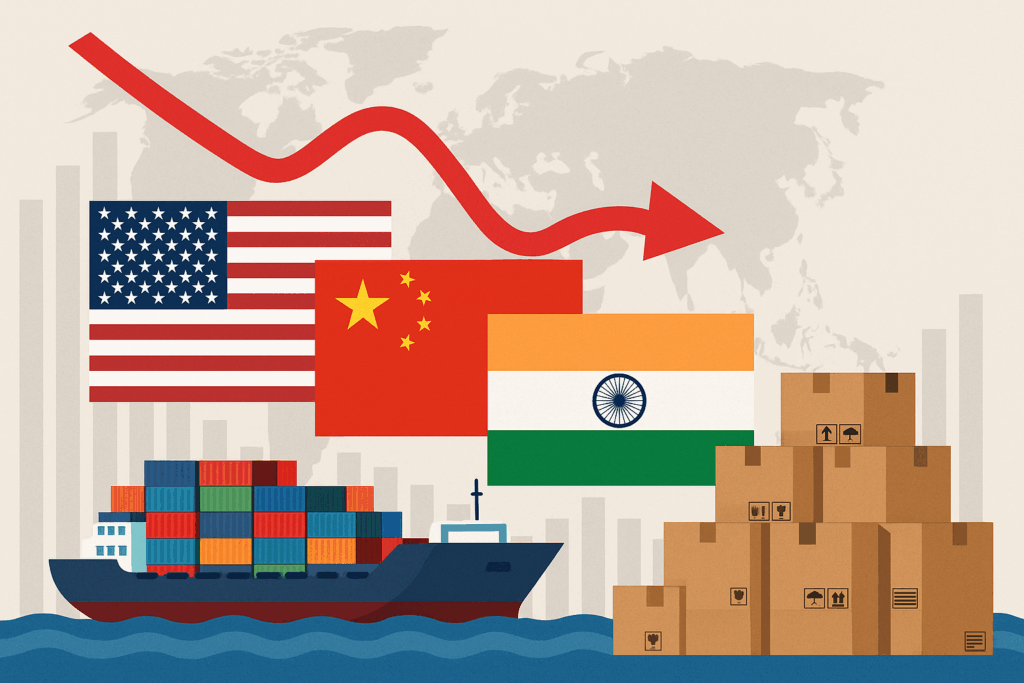Introduction
In a world where trade dynamics change overnight, India now finds itself navigating choppier waters. The recently brokered US-China trade truce, hailed as a pause in one of the most disruptive economic showdowns of the decade, has raised eyebrows in New Delhi. While the détente between the two superpowers may have cooled tensions globally, it has simultaneously increased the pressure on Indian negotiators striving to ink a favorable bilateral trade agreement with the United States.
The deal, which includes a 90-day US-China tariff truce and renewed commitments to open supply chains, is likely to sway global trade currents in China’s favor again. For India, which was capitalizing on the void left by Chinese exports during the tariff war, this shift could mean diminished interest in its products and a longer wait before any real gains from its US negotiations materialize. With Indian officials once again headed to Washington, the road ahead looks more complex than ever.
Key Takeaways
- US-China trade truce reopens supply lines, threatening India’s export advantages.
- 90-day tariff cut includes US duties on Chinese imports falling to 10% from 125%.
- Duties rescheduled to kick in by July 8, providing a narrow window of reprieve.
- India’s trade negotiations with the US could slow due to reduced urgency.
- China to suspend rare earth export controls, affecting Indian electronics & defense industries.
- Markets surged, with Dow up 1,000 points and S&P climbing 2.6%.
- India’s strategy must focus on diversification, local manufacturing, and alternative trade routes.
The US-China Trade Deal: A Temporary Relief or Tactical Pause?
The United States and China, the world’s two largest trading economies, reached a temporary agreement that promises a 90-day ceasefire in their escalating tariff war. While no long-term settlement was achieved, both parties agreed to suspend or roll back certain punitive tariffs that had brought trade to a virtual standstill.
As part of the deal:
- The US will cut extra tariffs to 30% from a peak of 145% by May 14.
- Chinese duties on US imports will fall to 10% from 125%, a significant temporary relief.
- Both countries agreed to cancel 10% in tariffs and suspend another 24% for 90 days.
- Full duty enforcement is now rescheduled to begin July 8, unless further progress is made.
This arrangement has injected short-term optimism into global markets and unlocked blocked trade flows in sectors like electronics, machinery, and raw materials.
Rollback on Rare Earths and Tariffs
China, under pressure from global industries, agreed to suspend or remove export controls on rare earth materials critical to everything from mobile phones to missiles. The rollback came after China added more US companies to its “unreliable entities” list and restricted rare earth exports on April 2.
This move not only eases pressure on American industries but also directly impacts India, which had seen an opportunity to position itself as a stable alternative supplier. Now, that window is shrinking.
India’s Position in the Crossfire
India, which had been hoping to step into the void created by China’s absence in the global supply chain, now finds itself scrambling for leverage. With the US and China agreeing to temporarily reopen trade flows, the attractiveness of Indian goods – especially in sectors like textiles, pharmaceuticals, electronics, and machinery – may diminish.
In addition, Indian officials are headed back to Washington DC to push forward the long-discussed bilateral trade deal with the United States. The renewed US-China engagement could delay progress, especially if American negotiators feel less pressure to diversify sourcing options or open new trade corridors.
The 90-day period also raises concerns about “front-loading” – the practice of exporters flooding markets with shipments before tariff hikes are reinstated. If Chinese exporters capitalize on this window, India’s pricing and volume competitiveness may take a direct hit.
Challenges for Indian Negotiators
Indian trade negotiators now have a harder sell. Any trade deal with the US must overcome several hurdles:
- Pressure to match or beat Chinese price points.
- Decreased urgency on the American side.
- Concerns about India’s tariff structure and regulatory barriers.
- India’s data localization and e-commerce rules that conflict with US commercial interests.
Moreover, India has walked away from major trade platforms in the past, such as the Regional Comprehensive Economic Partnership (RCEP), to protect domestic industries. This makes striking bilateral deals more important – but also more politically sensitive.
Signals from Geneva: Diplomatic Subtext
At a press conference in Geneva following the weekend negotiations, US Treasury Secretary Scott Bessent emphasized that the two sides had “a shared interest” in avoiding further economic fragmentation. He noted that “neither side wanted a decoupling,” a term that refers to a full-blown severing of economic ties.
His Chinese counterpart, He Lifeng, Vice-Premier for economic policy, echoed the sentiment, saying that Beijing would suspend retaliatory tariffs and explore deeper cooperation. Although the mood was optimistic, the absence of binding commitments on structural reforms leaves many analysts skeptical.
Jamieson Greer, the US Trade Representative, highlighted the spirit of “mutual understanding and mutual respect,” while also subtly reminding the world that China was the only country to retaliate comprehensively after former President Trump’s wave of reciprocal tariffs in 2023.
Winners and Worriers: Business Impact Worldwide
The announcement of the truce was a shot in the arm for global markets. Indices in Tokyo, Frankfurt, London, and New York surged. Sectors like automotive, semiconductors, and heavy machinery, which had suffered due to rising costs and uncertainty, reacted positively.
- Dow Jones surged nearly 1,000 points in early trade.
- S&P 500 jumped 2.6%, reflecting improved investor sentiment.
However, economists remain cautious. The tariff truce does not address structural tensions, and there’s still a risk of inflation due to inconsistent supply. If the 90-day agreement ends without extension or permanent settlement, businesses could face another round of instability.
A concerning measure left in place is a 10% baseline tariff applied to all US trading partners, and 20% for those not aiding in the crackdown on fentanyl, indicating continued pressure on countries like India.
Industries on High Alert
Industries particularly vulnerable to this realignment include:
| Sector | Potential Risk for India |
| Pharmaceuticals | Price-based competition from reopened Chinese supply |
| Electronics | Re-entry of cheaper Chinese components |
| Textiles | US buyers shifting back to Chinese suppliers |
| Agriculture | US-China deals squeezing Indian agri-exports |
| Defense & Automotive | Resumption of Chinese rare earth exports challenges India’s value-add |
India’s Strategic Options: What Can Be Done?
India can’t afford to sit still. With the rug partially pulled from under its trade ambitions, the country must recalibrate fast. Here are a few strategic options on the table:

1. Fast-Track FTAs: India must push forward trade agreements with the EU, UK, Australia, and ASEAN. Diversifying trade relations will reduce dependency on US-China dynamics.
2. Focus on Manufacturing: Building on the ‘Make in India’ initiative, the country needs to scale up production capabilities in high-demand sectors like electronics, defense, and clean energy.
3. Export Incentives & Market Expansion: Offering new incentives to Indian exporters and exploring underutilized markets in Africa and Latin America can balance trade losses from the US-China deal.
4. Supply Chain Alliances: Collaborating with countries like Japan, South Korea, and Vietnam to build alternative supply chains could establish India as a central trade node.
What Experts Are Saying
Economists in New Delhi are cautiously optimistic but warn that time is of the essence.
“This deal is a temporary storm shelter, not a lighthouse,” said Dr. Meera Krishnan, a senior fellow at the Indian Council for Research on International Economic Relations (ICRIER). “India needs to solidify trade alliances and develop resilience across sectors, or risk getting sidelined again when giants make up.”
Similarly, former commerce secretary Rahul Khullar remarked that India’s biggest challenge remains policy consistency and signalling trust to investors: “Trade partners want predictability, not hesitation.”
Conclusion
The US-China trade truce, while a global sigh of relief in some quarters, has set off alarm bells in others—particularly in India. As supply lines to and from China reopen, Indian exporters and policymakers face a harder climb toward the elusive US-India trade deal. The return of Chinese competition, coupled with geopolitical unpredictability, leaves India with a tighter negotiation window and fewer cards to play.
Yet all is not lost. With the right policy mix, trade diplomacy, and regional alignment, India can still be a reliable and efficient global trade partner. What’s needed now is a proactive stance and a long-term strategy that transcends temporary global trends. Because in the high-stakes world of international trade, resilience – not luck – is the true competitive edge.
Reference: Times of India
